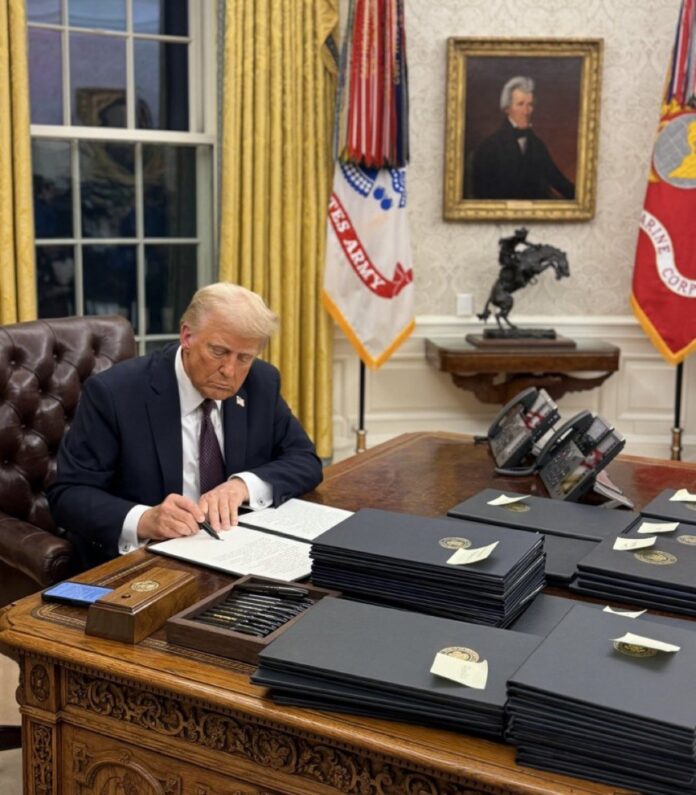The United States is at a critical juncture, grappling with its identity as a land of opportunity and the increasingly stringent immigration policies shaping its future. The recent surge in mass deportations under President Donald Trump’s administration has ignited fervent debates, prompting crucial questions about economic stability, social justice, and political motivations. Is this a necessary step to uphold immigration laws, or does it risk tearing apart the very fabric of the nation? Let’s take a closer look into the urgent and far-reaching consequences of this policy.
The Economic Reality: A Fragile Balance
Undocumented immigrants are deeply woven into the American economy, often taking on jobs that many U.S.-born citizens are reluctant to do. In 2022 alone, according to American Immigration Council, these households contributed more than $75 billion in taxes and held over $250 billion in purchasing power—vital to industries such as agriculture, construction, manufacturing, and services.
The agricultural sector, in particular, stands on shaky ground. Farmers warn that deporting workers could create labor shortages, leaving crops unharvested and driving up food prices. The American Farm Bureau Federation estimates that such disruptions could cost the industry a staggering $30 billion per year.
However, critics argue that this reliance on undocumented labor exposes deeper flaws within the system. Why aren’t these industries offering competitive wages to attract American workers? The reality is complex, many undocumented laborers work for low pay under harsh conditions, raising ethical concerns about exploitation.
The Human Cost: Families Caught in the Crossfire
Beyond the economic consequences, mass deportations have a deeply personal toll. For millions of immigrants, the fear of being uprooted is a daily reality. Families are being separated, with U.S.-born children left behind as parents face deportation. Advocacy groups like the ACLU and United We Dream are ramping up efforts to provide legal support, conduct “know your rights” campaigns, and establish emergency response networks.
Yet, a moral dilemma remains: Should individuals who have lived, worked, and contributed to their communities for years—without committing any crimes—be forcibly removed? This debate isn’t just about legal enforcement; it cuts to the heart of America’s ethical responsibilities.
Politics and Hypocrisy: A Tale of Inaction
While Republicans frame strict deportation policies as essential for national security and job protection, Democrats have also come under fire. Despite controlling the White House and both chambers of Congress at times, they have failed to pass meaningful immigration reform or provide pathways to legal status for long-term undocumented residents.
For many, this exposes the political theater surrounding immigration policy. Critics accuse Democrats of using the issue as a campaign talking point rather than pursuing real solutions, while the Trump administration’s hardline stance is often seen as more about appeasing its base than addressing systemic flaws.
Trump’s Justification for Deportations
The Trump administration argues that mass deportations are necessary to:
- Protect American workers by reducing competition in the job market.
- Prevent crime, citing cases where undocumented immigrants have committed serious offenses.
- Strengthen national security, asserting that lax border policies pose potential risks.
However, studies indicate that immigrants—including undocumented individuals—are statistically less likely to commit crimes than native-born citizens. They also have lower incarceration rates. (Source: Migration Policy Institute). But Trump administration points to the fact that the affected immigrants came into the country illegally and therefore have broken the laws of the United States.
The Ripple Effects on the U.S. Economy
The consequences of mass deportations extend far beyond those directly affected. Key industries such as agriculture, construction, and services could face crippling labor shortages, driving up costs that would ultimately impact every American consumer.
Local economies that depend on immigrant spending could also take a hit. As families either leave or send money abroad rather than investing in their communities, businesses may struggle, and economic stagnation could follow.
The Real Issue: Who’s Benefiting from the Status Quo?
One overlooked aspect of this debate is the role of employers who exploit undocumented workers for cheap labor. For decades, certain industries have skirted immigration laws while benefiting from an easily exploitable workforce.
Some experts argue that instead of focusing solely on deportations, the government should crack down on businesses that hire undocumented workers without offering fair wages or benefits. Enforcing labor laws and holding employers accountable could help address the root issues without tearing families apart.
The Path Forward: Real Reform, Not Just Reaction
While mass deportations may appeal to some voters, they fail to address the broader issue: a deeply flawed immigration system that neither enforces laws effectively nor provides realistic pathways for legal work. To create a sustainable solution, advocates propose:
- Comprehensive Immigration Reform: Balancing enforcement with a clear, humane path to citizenship.
- Stronger Labor Protections: Preventing the exploitation of all workers, regardless of status.
- Fair Trade Policies: Addressing the economic conditions that drive migration in the first place.
As the country wrestles with these issues, the debate isn’t just about policies or borders—it’s about the very essence of American identity.
Balancing Immigration Enforcement with National Security
The United States faces a tough challenge: how to enforce immigration laws while ensuring national security. Recent cases of individuals with criminal backgrounds crossing the southern border have heightened concerns. To address this issue effectively, a balanced approach is needed, one that upholds the law while protecting both citizens and immigrants.
- Comprehensive Immigration Reform – Creating legal pathways for undocumented immigrants who meet specific criteria, like long-term residency and clean records, can help integrate law-abiding individuals into society.
- Community-Based Monitoring – Instead of detention centers, programs that use electronic check-ins or regular reporting can be more humane and cost-effective.
- Protecting Worker Rights – Strengthening labor laws ensures that immigrant workers are treated fairly and can report workplace violations without fear of deportation.
How Different States Handle Mass Deportations
States and cities take different approaches to federal immigration policies, reflecting their unique political and social climates:
- Sanctuary Cities – Places like San Francisco and Chicago limit cooperation with federal immigration authorities to protect undocumented residents and build community trust.
- Legal Support Initiatives – California has set aside up to $50 million for immigrant legal defense, showing proactive support against federal immigration crackdowns.
- Law Enforcement Priorities – Some police departments focus on community policing rather than immigration enforcement, recognizing that fear of deportation can prevent immigrants from reporting crimes. Police departments coorperate with Fedeal Bureau of Investigations and the Secret Service, but will not cooperate with ICE.
Reforming Labor Laws to Hold Employers Accountable
A key issue in immigration enforcement is the exploitation of undocumented workers. Several measures can address this problem:
- Stronger Labor Law Enforcement – Ensuring that labor laws apply to all workers, regardless of immigration status, while increasing penalties for employers who exploit workers.
- Employer Sanctions – Penalizing businesses that hire undocumented workers to discourage exploitation. However, this must be balanced with worker protections to prevent unintended harm.
- Union Support – Encouraging immigrant workers to join labor unions can help them negotiate fair wages and better working conditions.
Addressing Security Concerns
National security is often cited as a reason for stricter immigration policies. Cases of criminals re-entering the U.S. illegally fuel these concerns. For example, in a recent operation in Chicago, ICE agents arrested over 900 individuals, including gang members and a convicted child rapist who had been deported multiple times.
(Source: NYPost.com)
Former ICE director Tom Homan highlighted the risks of sanctuary city policies in an interview with TV personality, Dr. Phil, explaining that these policies force officers to make arrests in uncontrolled environments, putting law enforcement and the public at greater risk. Homan noted that ICE raids were targeted at known criminals but acknowledged there could be collateral arrests due to the nature of the operations. Local authorities in sanctuary cities refuses to cooperate and instead, provide support to undocumented immigrants.
Finding a Balanced Solution
The immigration debate isn’t just about laws and policies—it’s about people, economics, and security. Instead of focusing solely on enforcement, a more effective approach would involve comprehensive reform, stronger labor protections, and smarter border security.
By addressing the issue holistically, the U.S. can uphold its laws, keep its citizens safe, and ensure that all individuals are treated with dignity.
America’s Reflection: A Nation at a Moral Crossroads
Immigration has always been at the heart of America’s story—a story of growth, resilience, and innovation. But today, the nation faces a difficult reckoning. The current wave of deportations forces us to confront tough questions: Is AMERICA still the land of opportunity, or is it straying from the values that built the country? Ultimately, the future of immigration policy will shape more than just laws—it will define who America is as a nation.






